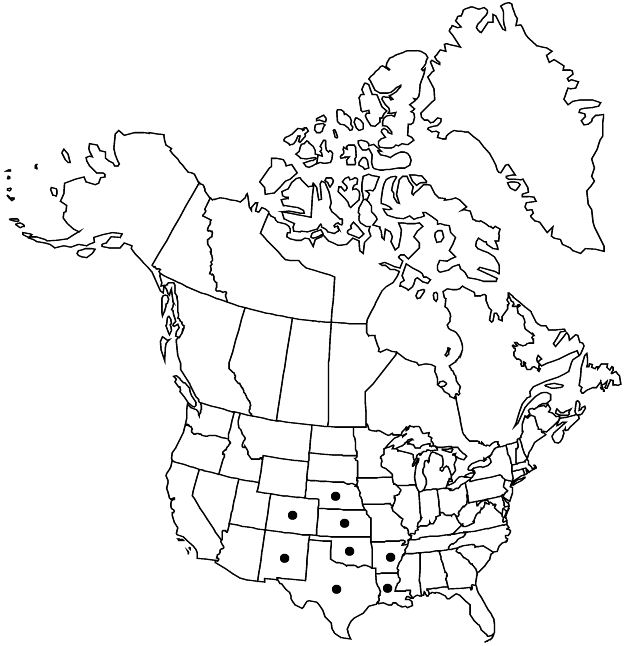Difference between revisions of "Linum berlandieri"
Bot. Mag. 63: plate 3480. 1836.
FNA>Volume Importer |
FNA>Volume Importer |
||
| Line 25: | Line 25: | ||
|distribution=w;c United States;n Mexico. | |distribution=w;c United States;n Mexico. | ||
|discussion=<p>Varieties 2 (2 in the flora).</p><!-- | |discussion=<p>Varieties 2 (2 in the flora).</p><!-- | ||
| − | --><p>The stems of Linum berlandieri are ribbed. The corollas range from pale yellow to deep orange, with darker veins and little color banding to deeply maroon at base. Styles and stamens may be yellow or the distinct portions of the styles somewhat maroon. The capsule walls are opaque, thicker than those in L. rigidum.</p><!-- | + | --><p>The stems of <i>Linum berlandieri</i> are ribbed. The corollas range from pale yellow to deep orange, with darker veins and little color banding to deeply maroon at base. Styles and stamens may be yellow or the distinct portions of the styles somewhat maroon. The capsule walls are opaque, thicker than those in <i>L. rigidum</i>.</p><!-- |
| − | --><p>C. M. Rogers (1984) noted that some populations of Linum berlandieri in western Texas are morphologically intermediate between the two varieties.</p> | + | --><p>C. M. Rogers (1984) noted that some populations of <i>Linum berlandieri</i> in western Texas are morphologically intermediate between the two varieties.</p> |
|tables= | |tables= | ||
|references= | |references= | ||
| Line 61: | Line 61: | ||
|publication year=1836 | |publication year=1836 | ||
|special status= | |special status= | ||
| − | |source xml=https://jpend@bitbucket.org/aafc-mbb/fna-data-curation.git/src/ | + | |source xml=https://jpend@bitbucket.org/aafc-mbb/fna-data-curation.git/src/8f726806613d60c220dc4493de13607dd3150896/coarse_grained_fna_xml/V12/V12_831.xml |
|genus=Linum | |genus=Linum | ||
|section=Linum sect. Linopsis | |section=Linum sect. Linopsis | ||
Revision as of 14:50, 18 September 2019
Herbs, usually annual, rarely perennial, 5–40 cm, glabrous except hirsutulous near base and sometimes on stem angles. Stems spreading-ascending, branching basally in inflorescence, sometimes throughout. Leaves: basal leaves opposite, or alternate throughout, spreading; stipular glands usually present; blade linear to linear-lanceolate, 10–25 × 1–4 mm, margins entire or few small teeth on distal leaves, not ciliate, apex acute; mostly 3-nerved. Inflorescences dense, ± flat-topped panicles. Pedicels 4–20 mm. Flowers: sepals deciduous, lanceolate, inner somewhat broader, 6–12 mm, margins of inner sepals densely and delicately glandular-toothed, outer ones scarious, conspicuously and more coarsely but less densely glandular-toothed than inner, apex acute or attenuate; petals yellow to orange, sometimes reddish below middle, broadly obovate, 11–19 mm; stamens 4–9 mm; anthers 1–2 mm; staminodia absent; styles connate nearly to apex, 6–9 mm; stigmas capitate. Capsules broadly ovoid to triangular-ovoid, tapering abruptly to flattened base, 3.6–4.7 × 3–4 mm, thick- or thin-walled, apex obtuse, dehiscing into 5, 2-seeded segments, segments blunt or subacute, persistent on plant, false septa complete, proximal part membranaceous, not terminating in loose fringe, distal part cartilaginous, margins not ciliate. Seeds 2.6–3.4 × 1–1.6 mm. 2n = 30.
Distribution

w, c United States, n Mexico.
Discussion
Varieties 2 (2 in the flora).
The stems of Linum berlandieri are ribbed. The corollas range from pale yellow to deep orange, with darker veins and little color banding to deeply maroon at base. Styles and stamens may be yellow or the distinct portions of the styles somewhat maroon. The capsule walls are opaque, thicker than those in L. rigidum.
C. M. Rogers (1984) noted that some populations of Linum berlandieri in western Texas are morphologically intermediate between the two varieties.
Selected References
None.
Key
| 1 | Sepals green; stigmas green; capsules relatively thick-walled, opaque. | Linum berlandieri var. berlandieri |
| 1 | Sepals grayish or purplish; stigmas dark gray; capsules relatively thin-walled, translucent. | Linum berlandieri var. filifolium |